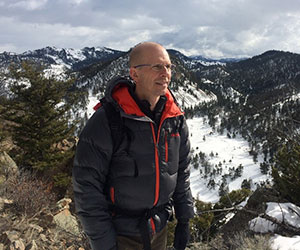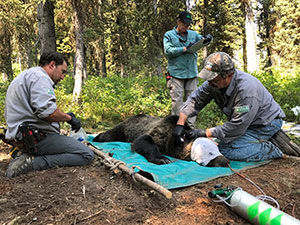Yellowstone Grizzly Recovery Topic of Seminar at UW-NPS Research Station July 13
Published July 10, 2023

Recovery of grizzly bears in the Yellowstone ecosystem is the topic of a Harlow Summer Seminar Thursday, July 13, at the University of Wyoming-National Park Service (UW-NPS) Research Station. The facility is located at the AMK Ranch in Grand Teton National Park.
Frank van Manen, a supervisory research wildlife biologist for the U.S. Geological Survey, will present “The remarkable recovery of the Yellowstone grizzly bear: biology, science and management.” The event begins at 5:30 p.m. with a barbecue, followed by the 6:30 p.m. seminar. The events are free and open to the public, although a $10 donation is suggested.
Formerly called the AMK Ranch Talk Series, the Harlow Summer Seminar Series is named after retired UW Department of Zoology and Physiology Professor Hank Harlow, who helped make the UW-NPS Research Station a significant center for research and community outreach. Harlow began the popular weekly public seminars during the summer months.
Van Manen says the fate of grizzly bears in the Yellowstone region was similar to that of large predator species worldwide, with indiscriminate killing in the 1800s and into the mid-1900s that resulted in severe population declines and range contraction.

Based on long-term data collected by the Interagency Grizzly Bear Study Team (IGBST), van Manen will explore the history, current status and future of grizzly bears in the greater Yellowstone ecosystem. The data provide important insights into factors that contributed to the recovery, the resilience of the iconic animal and the challenges that come with conservation success.
The IGBST is a science consortium of federal, state and tribal agencies established in 1973 to address research and monitoring needs of the greater Yellowstone grizzly bear population. Van Manen serves as the team leader.
The UW-NPS Research Station provides a base for university faculty members and government scientists from around the world to conduct research in the diverse aquatic and terrestrial environments of Grand Teton National Park and the greater Yellowstone area.
A cooperative effort between UW and the NPS for the past 66 years, the research station is located on the AMK Ranch historic district on a peninsula extending into Jackson Lake near Leeks Marina.

